
Europe and Mediterranean: Mediterranean and Greek Islands Voyage
Cunard
This 32-night voyage offers you time ashore in charming Mediterranean old towns and enchanting islands. You'll board Queen Victoria in Trieste and disembark in the English port city of Southampton.

Executive Member Benefit
Executive Members receive an annual 2% Reward, up to $1,250, on qualified Costco Travel purchases
Digital Costco Shop Card
Member Exclusive: Digital Costco Shop Card with every Cunard sailing†
Sailing Itinerary

Note: Cruise itineraries are subject to change. Please verify ports and times directly with the cruise line.
Overview
Southampton is a port city on England’s south coast. It’s home to the Sea City Museum, with an interactive model of the Titanic, which departed from Southampton in 1912. Nearby, Southampton City Art Gallery specializes in modern British art. Solent Sky Museum features vintage aircraft like the iconic Spitfire. Tudor House & Garden displays artifacts covering over 800 years of history, including a penny-farthing bike.
Overview
Amsterdam is the Netherlands’ capital, known for its artistic heritage, elaborate canal system, and narrow houses with gabled facades, legacies of the city’s 17th-century Golden Age. Its Museum District houses the Van Gogh Museum, works by Rembrandt and Vermeer at the Rijksmuseum, and modern art at the Stedelijk. Cycling is key to the city’s character, and there are numerous bike paths.
Overview
Amsterdam is the Netherlands’ capital, known for its artistic heritage, elaborate canal system, and narrow houses with gabled facades, legacies of the city’s 17th-century Golden Age. Its Museum District houses the Van Gogh Museum, works by Rembrandt and Vermeer at the Rijksmuseum, and modern art at the Stedelijk. Cycling is key to the city’s character, and there are numerous bike paths.
Overview
Southampton is a port city on England’s south coast. It’s home to the Sea City Museum, with an interactive model of the Titanic, which departed from Southampton in 1912. Nearby, Southampton City Art Gallery specializes in modern British art. Solent Sky Museum features vintage aircraft like the iconic Spitfire. Tudor House & Garden displays artifacts covering over 800 years of history, including a penny-farthing bike.
Onboard the Queen Victoria
Queen Victoria
Year Built: 2007
Year Refurbished: 2017
Double Occupancy Capacity: 2052
Queen Victoria® is known for her elegance and her graceful splendour. Her unique facilities are amongst the most modern you will find and yet she has a special ambience so evocative of great liners past. With luxurious marbles, woods and rich fabrics she exudes elegance and is adored by her crew and passengers alike. Queen Victoria is infused with a sense of luxury and tradition, from the Royal Court Theatre, which includes the first private viewing boxes at sea, to the signature two-story library, featuring a spiral staircase and nearly 6,000 volumes, and "Cunardia," the first Cunard museum display at sea.
Activities & Services (included in cruise)
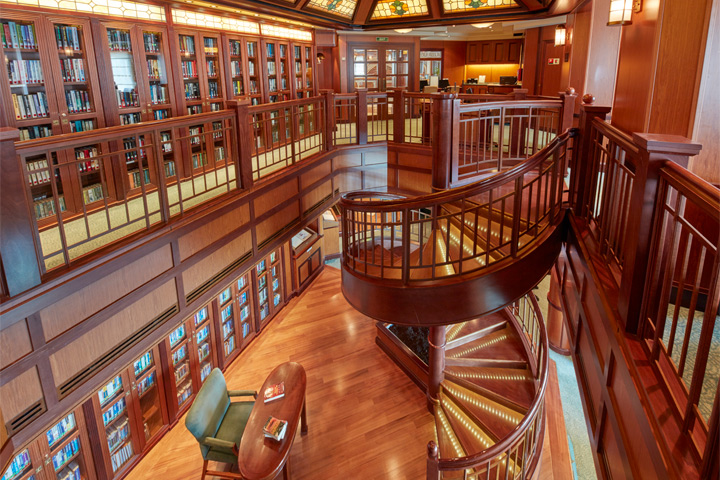
Library
- Card Room
- Casino
- Disco/Nightclub
- Movies
- Theater/Show Lounge
- Fitness Center
- Sauna/Steam Room
- Educational Programs
- Pool - Children's
- Pool - Outdoor
- Whirlpool/Jacuzzi
- Art Gallery
- Bars/Lounges
- Library
- Children's Outdoor Play Area
- Organized Age Specific Activities
- Teen Center or Disco
- Teen Programs
- Business Center
- Concierge Desk
- Duty-Free Shops/Boutiques
- Elevators
- Safe Deposit Boxes
Activities & Services (available for an extra fee)
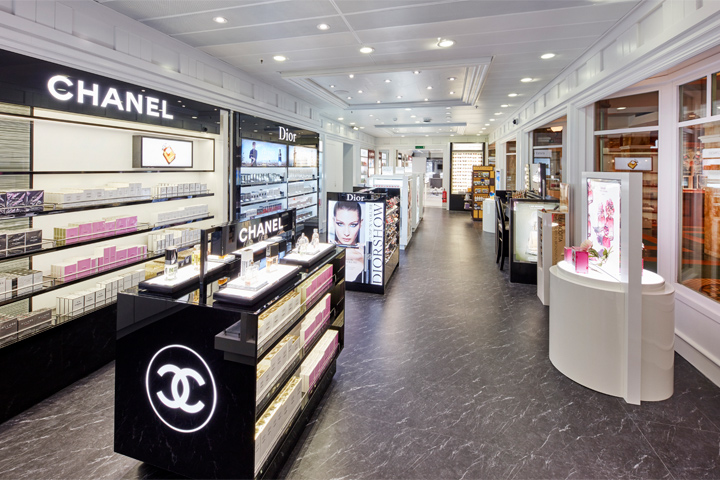
Shopping
- Beauty Salon
- Full-Service Spa
- Internet Center
- Babysitting
- Dry Cleaning/ Laundry Service
- Infirmary/Medical Center
- Self-Service Laundromat
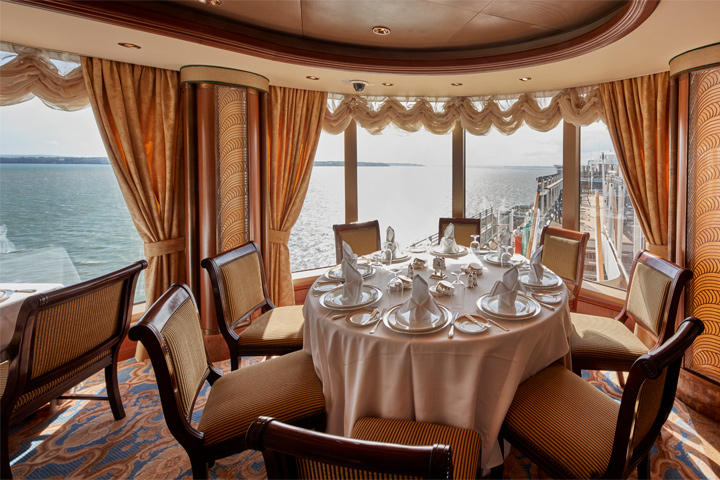
Queens Grill
Main Dining
Queens Grill Restaurant: Guests staying in the Queens Grill Suites have a table reserved in the Queens Grill Restaurant. You'll always be greeted warmly by name, and appreciate attentive service during breakfast, lunch and dinner. Dinner is served when you wish between 6:30 – 9 p.m.
Princess Grill Restaurant: The sophisticated, intimate Princess Grill serves up excellent cuisine for breakfast, lunch, and dinner. Dinner is served when you wish between 6:30 – 9 p.m. To match your choice, a sommelier will gladly talk through the impressive wine list. In warmer weather the courtyard offers alfresco dining, wonderful in more exotic parts of the world.
Britannnia Club Restaurant: The Britannia Club Restaurant boasts the same grandeur as the neighboring Britannia Restaurant, but with an intimate dining club atmosphere. Dine in the evening here whenever it suits you between 6:30 – 9 p.m.
Britannia Restaurant: Your table reservation is at Britannia Restaurant, where grandeur and occasion combine with exceptional service. Breakfast and lunch always feel special here and whether you've chosen to take your seat for dinner at 6 p.m. or 8:30 p.m., you can arrive with a flourish, down the steps of the curved staircase.
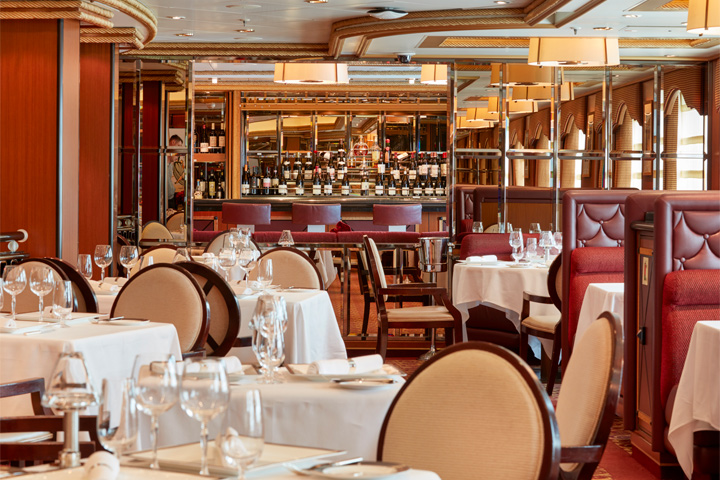
The Verandah
Specialty Dining
The Verandah: Steakhouse at The Verandah restaurant offers a sublime experience, whether it's lunch or dinner. Showcasing specialties such as prime USDA grain-finished New York strip steak and Alaskan king crab, alongside dishes celebrating British origin such as Salt Marsh lamb rack, as well as renowned Wagyu beef from farther afield. The menu is a celebration of the fine provenance of the US, British Isles and Australia. The Verandah takes design inspiration from the original Verandah Grill on board Queen Mary. This restaurant is available for an additional cost.
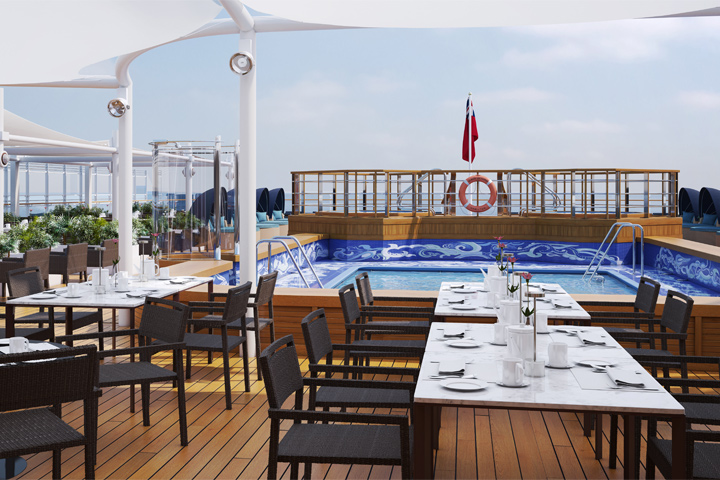
Lido Restaurant
Casual Dining
Lido Restaurant: Should you prefer a club sandwich or a light bite in the afternoon, head for the Lido Restaurant where buffet dining is available throughout the day. By evening, it transforms into one of three regional venues: Asado is a South American Grill; Jasmine serves up exquisite Asian cuisine; while Aztec tempts you with interpretations of Mexican classics.
Golden Lion Pub: A Cunard favorite, choose from a wide selection of beer, cider and wine to compliment the delicious gastro pub style menus in a comfortable, traditional setting. Enjoy all the British pub essentials such as quizzes, live music and screens to show your favorite sporting events.
Café Carinthia: Succumb to the varieties of fragrant specialty teas, rich aromatic coffees and indulgent pastries while overlooking the beautiful Grand Lobby. This restaurant is available for an additional cost.
Staterooms feature a king-sized bed, lounge area, desk with stationery and tasteful decor with a satellite TV, tea and coffee-making facilities, mini-bar, hairdryer, safe, an invigorating shower, complimentary robes and slippers and nightly turn-down service.
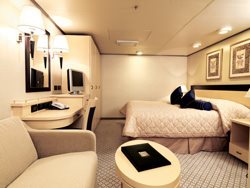
Category: IF
Area: Approximately 152 sq. ft.
With a variety of locations to choose from on board, our well-appointed Britannia Standard Inside staterooms are a haven of comfort and style to enjoy during your voyage. You'll find thoughtful features and luxurious amenities, all organized by your dedicated steward to ensure you are always attentively looked after.
Each Britannia Standard Inside stateroom includes:- Choice of Early, Late, and Open Dining in the Britannia Restaurant.
- Cunarder bed configurable to king-size or two single beds.
- Bathroom with a walk-in shower.
- Satellite TV with movie and music channels.
- Feature vanity and desk with hairdryer.
- UK, USA, and European power sockets.
- Penhaligon's toiletries.
- Bathrobes and slippers.
- Tea and coffee making facilities.
- Welcome sparkling wine.
- Complimentary room service menu.
- Mini-bar packages available for purchase.
- A dedicated steward to keep your stateroom in fine order day and night.

Category: IE
Area: Approximately 152 sq. ft.
With a variety of locations to choose from on board, our well-appointed Britannia Standard Inside staterooms are a haven of comfort and style to enjoy during your voyage. You'll find thoughtful features and luxurious amenities, all organized by your dedicated steward to ensure you are always attentively looked after.
Each Britannia Standard Inside stateroom includes:- Choice of Early, Late, and Open Dining in the Britannia Restaurant.
- Cunarder bed configurable to king-size or two single beds.
- Bathroom with a walk-in shower.
- Satellite TV with movie and music channels.
- Feature vanity and desk with hairdryer.
- UK, USA, and European power sockets.
- Penhaligon's toiletries.
- Bathrobes and slippers.
- Tea and coffee making facilities.
- Welcome sparkling wine.
- Complimentary room service menu.
- Mini-bar packages available for purchase.
- A dedicated steward to keep your stateroom in fine order day and night.

Category: ID
Area: Approximately 152 sq. ft.
With a variety of locations to choose from on board, our well-appointed Britannia Standard Inside staterooms are a haven of comfort and style to enjoy during your voyage. You'll find thoughtful features and luxurious amenities, all organized by your dedicated steward to ensure you are always attentively looked after.
Each Britannia Standard Inside stateroom includes:- Choice of Early, Late, and Open Dining in the Britannia Restaurant.
- Cunarder bed configurable to king-size or two single beds.
- Bathroom with a walk-in shower.
- Satellite TV with movie and music channels.
- Feature vanity and desk with hairdryer.
- UK, USA, and European power sockets.
- Penhaligon's toiletries.
- Bathrobes and slippers.
- Tea and coffee making facilities.
- Welcome sparkling wine.
- Complimentary room service menu.
- Mini-bar packages available for purchase.
- A dedicated steward to keep your stateroom in fine order day and night.

Category: IA
Area: Approximately 152 sq. ft.
With a variety of locations to choose from on board, our well-appointed Britannia Standard Inside staterooms are a haven of comfort and style to enjoy during your voyage. You'll find thoughtful features and luxurious amenities, all organized by your dedicated steward to ensure you are always attentively looked after.
Each Britannia Standard Inside stateroom includes:- Choice of Early, Late, and Open Dining in the Britannia Restaurant.
- Cunarder bed configurable to king-size or two single beds.
- Bathroom with a walk-in shower.
- Satellite TV with movie and music channels.
- Feature vanity and desk with hairdryer.
- UK, USA, and European power sockets.
- Penhaligon's toiletries.
- Bathrobes and slippers.
- Tea and coffee making facilities.
- Welcome sparkling wine.
- Complimentary room service menu.
- Mini-bar packages available for purchase.
- A dedicated steward to keep your stateroom in fine order day and night.

Category: GC
Area: Approximately 207 sq. ft.
With a variety of locations to choose from on board, our spacious Britannia Deluxe Inside staterooms are a haven of comfort and style to enjoy during your voyage. You'll find thoughtful features and luxurious amenities, all organized by your dedicated steward to ensure you are always attentively looked after.
Each Britannia Deluxe Inside stateroom includes:- Choice of Early, Late, and Open Dining in the Britannia Restaurant.
- Cunarder bed configurable to king-size or two single beds.
- Bathroom with a walk-in shower.
- Satellite TV with movie and music channels.
- Feature vanity and desk with hairdryer.
- UK, USA, and European power sockets.
- Penhaligon's toiletries.
- Bathrobes and slippers.
- Tea and coffee making facilities.
- Welcome sparkling wine.
- Complimentary room service menu.
- Mini-bar packages available for purchase.
- A dedicated steward to keep your stateroom in fine order day and night.

Category: GB
Area: Approximately 207 sq. ft.
With a variety of locations to choose from on board, our spacious Britannia Deluxe Inside staterooms are a haven of comfort and style to enjoy during your voyage. You'll find thoughtful features and luxurious amenities, all organized by your dedicated steward to ensure you are always attentively looked after.
Each Britannia Deluxe Inside stateroom includes:- Choice of Early, Late, and Open Dining in the Britannia Restaurant.
- Cunarder bed configurable to king-size or two single beds.
- Bathroom with a walk-in shower.
- Satellite TV with movie and music channels.
- Feature vanity and desk with hairdryer.
- UK, USA, and European power sockets.
- Penhaligon's toiletries.
- Bathrobes and slippers.
- Tea and coffee making facilities.
- Welcome sparkling wine.
- Complimentary room service menu.
- Mini-bar packages available for purchase.
- A dedicated steward to keep your stateroom in fine order day and night.

Category: GA
Area: Approximately 200-243 sq. ft.
With a variety of locations to choose from on board, our spacious Britannia Deluxe Inside staterooms are a haven of comfort and style to enjoy during your voyage. You'll find thoughtful features and luxurious amenities, all organized by your dedicated steward to ensure you are always attentively looked after.
Each Britannia Deluxe Inside stateroom includes:- Choice of Early, Late, and Open Dining in the Britannia Restaurant.
- Cunarder bed configurable to king-size or two single beds.
- Bathroom with a walk-in shower.
- Satellite TV with movie and music channels.
- Feature vanity and desk with hairdryer.
- UK, USA, and European power sockets.
- Penhaligon's toiletries.
- Bathrobes and slippers.
- Tea and coffee making facilities.
- Welcome sparkling wine.
- Complimentary room service menu.
- Mini-bar packages available for purchase.
- A dedicated steward to keep your stateroom in fine order day and night.

Category: LC
Area: Approximately 159 sq. ft.
Our spacious Britannia Single Inside staterooms are a haven of comfort and style to enjoy during your voyage. You'll find thoughtful features and luxurious amenities, all organized by your dedicated steward to ensure you are always attentively looked after.
Each Britannia Single Inside stateroom includes:- Choice of Early, Late, and Open Dining in the Britannia Restaurant.
- A generous width single bed and desk with stationery.
- Bathroom with a walk-in shower.
- Satellite TV with movie and music channels.
- Feature vanity with hairdryer.
- UK, USA, and European power sockets.
- Penhaligon's toiletries.
- Bathrobes and slippers.
- Tea and coffee making facilities.
- Welcome sparkling wine.
- Complimentary room service menu.
- Mini-bar packages available for purchase.
- A dedicated steward to keep your stateroom in fine order day and night.
Staterooms feature a king-sized bed, lounge area, desk with stationery and tasteful decor with a satellite TV, tea and coffee-making facilities, mini-bar, hairdryer, safe, an invigorating shower, complimentary robes and slippers and nightly turn-down service. A window offering an ocean view (some partially obstructed) offering an invigorating burst of natural daylight.
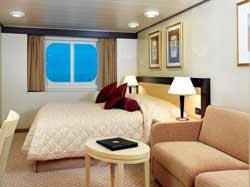
Category: FC
Area: Approximately 180 sq. ft.
Our Britannia Oceanview (obstructed view) staterooms provide a private enclave from which to watch the world go by. You'll find thoughtful features and luxurious amenities, all organized by your dedicated steward to ensure you are always attentively looked after.
Each Britannia Oceanview (obstructed view) stateroom includes:- Choice of Early, Late, and Open Dining in the Britannia Restaurant.
- Lounge area with seating.
- Cunarder bed configurable to king-size or two single beds.
- Bathroom with a walk-in shower.
- A window offering a slightly obscured outside view.
- Satellite TV with movie and music channels.
- Feature vanity and desk with hairdryer.
- UK, USA, and European power sockets.
- Penhaligon's toiletries.
- Bathrobes and slippers.
- Tea and coffee making facilities.
- Welcome sparkling wine.
- Complimentary room service menu.
- Mini-bar packages available for purchase.
- A dedicated steward to keep your stateroom in fine order day and night.

Category: FB
Area: Approximately 180 sq. ft.
Our Britannia Oceanview (obstructed view) staterooms provide a private enclave from which to watch the world go by. You'll find thoughtful features and luxurious amenities, all organized by your dedicated steward to ensure you are always attentively looked after.
Each Britannia Oceanview (obstructed view) stateroom includes:- Choice of Early, Late, and Open Dining in the Britannia Restaurant.
- Lounge area with seating.
- Cunarder bed configurable to king-size or two single beds.
- Bathroom with a walk-in shower.
- A window offering a slightly obscured outside view.
- Satellite TV with movie and music channels.
- Feature vanity and desk with hairdryer.
- UK, USA, and European power sockets.
- Penhaligon's toiletries.
- Bathrobes and slippers.
- Tea and coffee making facilities.
- Welcome sparkling wine.
- Complimentary room service menu.
- Mini-bar packages available for purchase.
- A dedicated steward to keep your stateroom in fine order day and night.

Category: EF
Area: Approximately 197-201 sq. ft.
Positioned to offer sea views, our Britannia Oceanview staterooms provide a private enclave from which to watch the world go by. Perfectly framed views are the backdrop to thoughtful features and luxurious amenities, all organized by your dedicated steward to ensure you are always attentively looked after.
Each Britannia Oceanview stateroom includes:- Choice of Early, Late, and Open Dining in the Britannia Restaurant.
- Lounge area with seating.
- Cunarder bed configurable to king-size or two single beds.
- Bathroom with a walk-in shower.
- Window with sea view.
- Satellite TV with movie and music channels.
- Feature vanity and desk with hairdryer.
- UK, USA, and European power sockets.
- Penhaligon's toiletries.
- Bathrobes and slippers.
- Tea and coffee making facilities.
- Welcome sparkling wine.
- Complimentary room service menu.
- Mini-bar packages available for purchase.
- A dedicated steward to keep your stateroom in fine order day and night.

Category: EC
Area: Approximately 197 sq. ft.
Positioned to offer sea views, our Britannia Oceanview staterooms provide a private enclave from which to watch the world go by. Perfectly framed views are the backdrop to thoughtful features and luxurious amenities, all organized by your dedicated steward to ensure you are always attentively looked after.
Each Britannia Oceanview stateroom includes:- Choice of Early, Late, and Open Dining in the Britannia Restaurant.
- Lounge area with seating.
- Cunarder bed configurable to king-size or two single beds.
- Bathroom with a walk-in shower.
- Window with sea view.
- Satellite TV with movie and music channels.
- Feature vanity and desk with hairdryer.
- UK, USA, and European power sockets.
- Penhaligon's toiletries.
- Bathrobes and slippers.
- Tea and coffee making facilities.
- Welcome sparkling wine.
- Complimentary room service menu.
- Mini-bar packages available for purchase.
- A dedicated steward to keep your stateroom in fine order day and night.

Category: EB
Area: Approximately 197 sq. ft.
Positioned to offer sea views, our Britannia Oceanview staterooms provide a private enclave from which to watch the world go by. Perfectly framed views are the backdrop to thoughtful features and luxurious amenities, all organized by your dedicated steward to ensure you are always attentively looked after.
Each Britannia Oceanview stateroom includes:- Choice of Early, Late, and Open Dining in the Britannia Restaurant.
- Lounge area with seating.
- Cunarder bed configurable to king-size or two single beds.
- Bathroom with a walk-in shower.
- Window with sea view.
- Satellite TV with movie and music channels.
- Feature vanity and desk with hairdryer.
- UK, USA, and European power sockets.
- Penhaligon's toiletries.
- Bathrobes and slippers.
- Tea and coffee making facilities.
- Welcome sparkling wine.
- Complimentary room service menu.
- Mini-bar packages available for purchase.
- A dedicated steward to keep your stateroom in fine order day and night.

Category: KC
Area: Approximately 133-168 sq. ft.
Positioned to offer sea views, our Britannia Single Oceanview staterooms provide a private enclave from which to watch the world go by. Perfectly framed views are the backdrop to thoughtful features and luxurious amenities, all organized by your dedicated steward to ensure you are always attentively looked after.
Each Britannia Single Oceanview stateroom includes:- Choice of Early, Late, and Open Dining in the Britannia Restaurant.
- Lounge area with seating.
- Comfortable Cunarder single bed.
- Bathroom with a walk-in shower.
- Window with sea view.
- Satellite TV with movie and music channels.
- Feature vanity and desk with hairdryer.
- UK, USA, and European power sockets.
- Penhaligon's toiletries.
- Bathrobes and slippers.
- Tea and coffee making facilities.
- Welcome sparkling wine.
- Complimentary room service menu.
- Mini-bar packages available for purchase.
- A dedicated steward to keep your stateroom in fine order day and night.
Staterooms feature a king-sized bed, lounge area, desk with stationery and tasteful decor with a satellite TV, tea and coffee-making facilities, mini-bar, hairdryer, safe, an invigorating shower, complimentary robes and slippers and nightly turn-down service. Drink in the scenery from your ship in the privacy of your own on-board balcony.
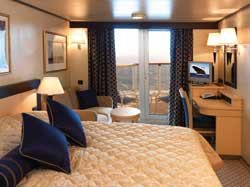
Category: CB
Area: Approximately 228-408 sq. ft.
Enjoy access to private, outdoor space in one of our obstructed view Britannia Balcony staterooms. You'll find thoughtful features and luxurious amenities, all organized by your dedicated steward to ensure you are always attentively looked after.
Each Britannia Balcony (obstructed view) stateroom includes:- Choice of Early, Late, and Open Dining in the Britannia Restaurant.
- Private balcony (obstructed view) with seating.
- Lounge area with seating.
- Cunarder bed configurable to king-size or two single beds.
- Bathroom with walk-in shower.
- Satellite TV with movie and music channels.
- Feature vanity and desk with hairdryer.
- UK, USA, and European power sockets.
- Penhaligon's toiletries.
- Bathrobes and slippers.
- Tea and coffee making facilities.
- Welcome sparkling wine.
- Complimentary room service menu.
- Mini-bar packages available for purchase.
- A dedicated steward to keep your stateroom in fine order day and night.

Category: CA
Area: Approximately 228 sq. ft.
Enjoy access to private, outdoor space in one of our obstructed view Britannia Balcony staterooms. You'll find thoughtful features and luxurious amenities, all organized by your dedicated steward to ensure you are always attentively looked after.
Each Britannia Balcony (obstructed view) stateroom includes:- Choice of Early, Late, and Open Dining in the Britannia Restaurant.
- Private balcony (obstructed view) with seating.
- Lounge area with seating.
- Cunarder bed configurable to king-size or two single beds.
- Bathroom with walk-in shower.
- Satellite TV with movie and music channels.
- Feature vanity and desk with hairdryer.
- UK, USA, and European power sockets.
- Penhaligon's toiletries.
- Bathrobes and slippers.
- Tea and coffee making facilities.
- Welcome sparkling wine.
- Complimentary room service menu.
- Mini-bar packages available for purchase.
- A dedicated steward to keep your stateroom in fine order day and night.

Category: BF
Area: Approximately 242-264 sq. ft.
Drink in sparkling sea views from your own private, outdoor space in one of our Britannia Balcony staterooms. You'll find thoughtful features and luxurious amenities, all organized by your dedicated steward to ensure you are always attentively looked after.
Each Britannia Balcony stateroom includes:- Choice of Early, Late, and Open Dining in the Britannia Restaurant.
- Private balcony with seating and sea views.
- Lounge area with seating.
- Cunarder bed configurable to king-size or two single beds.
- Bathroom with walk-in shower.
- Satellite TV with movie and music channels.
- Feature vanity and desk with hairdryer.
- UK, USA, and European power sockets.
- Penhaligon's toiletries.
- Bathrobes and slippers.
- Tea and coffee making facilities.
- Welcome sparkling wine.
- Complimentary room service menu.
- Mini-bar packages available for purchase.
- A dedicated steward to keep your stateroom in fine order day and night.

Category: BE
Area: Approximately 242-339 sq. ft.
Drink in sparkling sea views from your own private, outdoor space in one of our Britannia Balcony staterooms. You'll find thoughtful features and luxurious amenities, all organized by your dedicated steward to ensure you are always attentively looked after.
Each Britannia Balcony stateroom includes:- Choice of Early, Late, and Open Dining in the Britannia Restaurant.
- Private balcony with seating and sea views.
- Lounge area with seating.
- Cunarder bed configurable to king-size or two single beds.
- Bathroom with walk-in shower.
- Satellite TV with movie and music channels.
- Feature vanity and desk with hairdryer.
- UK, USA, and European power sockets.
- Penhaligon's toiletries.
- Bathrobes and slippers.
- Tea and coffee making facilities.
- Welcome sparkling wine.
- Complimentary room service menu.
- Mini-bar packages available for purchase.
- A dedicated steward to keep your stateroom in fine order day and night.

Category: BD
Area: Approximately 242 sq. ft.
Drink in sparkling sea views from your own private, outdoor space in one of our Britannia Balcony staterooms. You'll find thoughtful features and luxurious amenities, all organized by your dedicated steward to ensure you are always attentively looked after.
Each Britannia Balcony stateroom includes:- Choice of Early, Late, and Open Dining in the Britannia Restaurant.
- Private balcony with seating and sea views.
- Lounge area with seating.
- Cunarder bed configurable to king-size or two single beds.
- Bathroom with walk-in shower.
- Satellite TV with movie and music channels.
- Feature vanity and desk with hairdryer.
- UK, USA, and European power sockets.
- Penhaligon's toiletries.
- Bathrobes and slippers.
- Tea and coffee making facilities.
- Welcome sparkling wine.
- Complimentary room service menu.
- Mini-bar packages available for purchase.
- A dedicated steward to keep your stateroom in fine order day and night.

Category: BC
Area: Approximately 256-383 sq. ft.
Drink in sparkling sea views from your own private, outdoor space in one of our Britannia Balcony staterooms. You'll find thoughtful features and luxurious amenities, all organized by your dedicated steward to ensure you are always attentively looked after.
Each Britannia Balcony stateroom includes:- Choice of Early, Late, and Open Dining in the Britannia Restaurant.
- Private balcony with seating and sea views.
- Lounge area with seating.
- Cunarder bed configurable to king-size or two single beds.
- Bathroom with walk-in shower.
- Satellite TV with movie and music channels.
- Feature vanity and desk with hairdryer.
- UK, USA, and European power sockets.
- Penhaligon's toiletries.
- Bathrobes and slippers.
- Tea and coffee making facilities.
- Welcome sparkling wine.
- Complimentary room service menu.
- Mini-bar packages available for purchase.
- A dedicated steward to keep your stateroom in fine order day and night.

Category: BB
Area: Approximately 228-470 sq. ft.
Drink in sparkling sea views from your own private, outdoor space in one of our Britannia Balcony staterooms. You'll find thoughtful features and luxurious amenities, all organized by your dedicated steward to ensure you are always attentively looked after.
Each Britannia Balcony stateroom includes:- Choice of Early, Late, and Open Dining in the Britannia Restaurant.
- Private balcony with seating and sea views.
- Lounge area with seating.
- Cunarder bed configurable to king-size or two single beds.
- Bathroom with walk-in shower.
- Satellite TV with movie and music channels.
- Feature vanity and desk with hairdryer.
- UK, USA, and European power sockets.
- Penhaligon's toiletries.
- Bathrobes and slippers.
- Tea and coffee making facilities.
- Welcome sparkling wine.
- Complimentary room service menu.
- Mini-bar packages available for purchase.
- A dedicated steward to keep your stateroom in fine order day and night.

Category: BA
Area: Approximately 228-472 sq. ft.
Drink in sparkling sea views from your own private, outdoor space in one of our Britannia Balcony staterooms. You'll find thoughtful features and luxurious amenities, all organized by your dedicated steward to ensure you are always attentively looked after.
Each Britannia Balcony stateroom includes:- Choice of Early, Late, and Open Dining in the Britannia Restaurant.
- Private balcony with seating and sea views.
- Lounge area with seating.
- Cunarder bed configurable to king-size or two single beds.
- Bathroom with walk-in shower.
- Satellite TV with movie and music channels.
- Feature vanity and desk with hairdryer.
- UK, USA, and European power sockets.
- Penhaligon's toiletries.
- Bathrobes and slippers.
- Tea and coffee making facilities.
- Welcome sparkling wine.
- Complimentary room service menu.
- Mini-bar packages available for purchase.
- A dedicated steward to keep your stateroom in fine order day and night.

Category: A2
Area: Approximately 258-307 sq. ft.
Take advantage of prime sea views from your own private, outdoor space in one of our Britannia Club Balcony staterooms. You'll find thoughtful features, luxurious amenities and benefits, all organized by your dedicated steward to ensure you are always attentively looked after.
Each Britannia Club Balcony stateroom includes:- Access to the intimate Britannia Club restaurant with a reserved table throughout your voyage.
- Private balcony with seating and sea views.
- Lounge area with seating.
- Cunarder bed configurable to king-size or two single beds.
- Bathroom with walk-in shower.
- Satellite TV with movie and music channels.
- Feature vanity and desk with hairdryer.
- UK, USA, and European power sockets.
- Pillow concierge menu with a variety of types to choose from.
- Penhaligon's toiletries.
- Bathrobes and slippers.
- Specialty tea and coffee making facilities.
- Complimentary spring water replenished throughout your voyage.
- A welcome bottle of sparkling wine.
- Complimentary room service menu.
- Mini-bar packages available for purchase.
- A dedicated steward to keep your stateroom in fine order day and night.
- Priority embarkation and disembarkation.

Category: A1
Area: Approximately 254-470 sq. ft.
Take advantage of prime sea views from your own private, outdoor space in one of our Britannia Club Balcony staterooms. You'll find thoughtful features, luxurious amenities and benefits, all organized by your dedicated steward to ensure you are always attentively looked after.
Each Britannia Club Balcony stateroom includes:- Access to the intimate Britannia Club restaurant with a reserved table throughout your voyage.
- Private balcony with seating and sea views.
- Lounge area with seating.
- Cunarder bed configurable to king-size or two single beds.
- Bathroom with walk-in shower.
- Satellite TV with movie and music channels.
- Feature vanity and desk with hairdryer.
- UK, USA, and European power sockets.
- Pillow concierge menu with a variety of types to choose from.
- Penhaligon's toiletries.
- Bathrobes and slippers.
- Specialty tea and coffee making facilities.
- Complimentary spring water replenished throughout your voyage.
- A welcome bottle of sparkling wine.
- Complimentary room service menu.
- Mini-bar packages available for purchase.
- A dedicated steward to keep your stateroom in fine order day and night.
- Priority embarkation and disembarkation.
Staterooms feature a king-sized bed, lounge area, desk with stationery and tasteful decor with a satellite TV, tea and coffee-making facilities, mini-bar, hairdryer, safe, a bathtub and shower, separate dressing area, velour robes and slippers and nightly turn-down service. Drink in the scenery from your ship in the privacy of your own on-board balcony. Spacious suites feature a separate seating area, a balcony and the Grills Experience. Select suites feature whirlpool bath and butler service and other exclusive amenities.
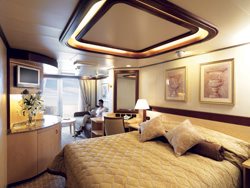
Category: P2
Area: Approximately 335-513 sq. ft.
Delight in a prime location on board with sea views that can be enjoyed from both in and outside your Princess Suite. You'll find thoughtful features and luxurious amenities, all organized by your dedicated steward to ensure you are always attentively looked after.
Each Princess Grill Suite includes:- Exclusive access to the Princess Grill restaurant, where you can dine any time at your reserved table.
- Private balcony with seating and sea views.
- Spacious lounge area with seating.
- Bedroom area with Cunarder bed configurable to king-size or two single beds.
- Pillow concierge menu with a variety of types to choose from.
- Bathroom with bath and shower.
- Satellite TV with movie and music channels in lounge and bedroom areas.
- Feature vanity and desk with hairdryer.
- UK, USA, and European power sockets.
- Penhaligon's toiletries.
- Luxury bathrobes and slippers.
- Feature mini-bar with specialty tea and coffee making facilities.
- Complimentary spring water replenished throughout your voyage.
- Mini-bar packages available for purchase.
- Welcome bottle of sparkling wine.
- Complimentary room service menu.
- Dine in-suite from the exquisite Princess Grill menu.
- Exclusive access to the Grills Lounge and outside Grills Terrace.
- Concierge service for on-board reservations and shore experiences.
- A dedicated steward to keep your suite in fine order day and night.
- Priority embarkation and disembarkation.

Category: P1
Area: Approximately 335-345 sq. ft.
Delight in a prime location on board with sea views that can be enjoyed from both in and outside your Princess Suite. You'll find thoughtful features and luxurious amenities, all organized by your dedicated steward to ensure you are always attentively looked after.
Each Princess Grill Suite includes:- Exclusive access to the Princess Grill restaurant, where you can dine any time at your reserved table.
- Private balcony with seating and sea views.
- Spacious lounge area with seating.
- Bedroom area with Cunarder bed configurable to king-size or two single beds.
- Pillow concierge menu with a variety of types to choose from.
- Bathroom with bath and shower.
- Satellite TV with movie and music channels in lounge and bedroom areas.
- Feature vanity and desk with hairdryer.
- UK, USA, and European power sockets.
- Penhaligon's toiletries.
- Luxury bathrobes and slippers.
- Feature mini-bar with specialty tea and coffee making facilities.
- Complimentary spring water replenished throughout your voyage.
- Mini-bar packages available for purchase.
- Welcome bottle of sparkling wine.
- Complimentary room service menu.
- Dine in-suite from the exquisite Princess Grill menu.
- Exclusive access to the Grills Lounge and outside Grills Terrace.
- Concierge service for on-board reservations and shore experiences.
- A dedicated steward to keep your suite in fine order day and night.
- Priority embarkation and disembarkation.
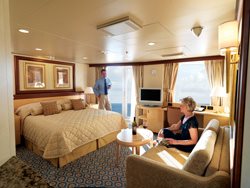
Category: Q6
Area: Approximately 484-707 sq. ft.
Retreat to an exclusive world of luxury with your own private residence at sea. Bold Cunard accent colors and thoughtful designs bring each space in your suite to life. An attentive butler is on hand at all times to truly customize your voyage experience.
Each Queens Grill Suite includes:- Access to the exclusive Queens Grill restaurant, where you can dine any time at your reserved table.
- Spacious lounge area with seating.
- Bedroom area with Cunarder bed configurable to king-size or two single beds.
- Pillow concierge menu with a variety of types to choose from.
- Bathroom with bath and shower and separate dressing area.
- Spacious private balcony with seating and sea views.
- Satellite TV with movie and music channels in bedroom and lounge areas.
- Feature vanity and desk with hairdryer.
- Fresh flowers.
- Binoculars and world atlas to track your travels.
- UK, USA, and European power sockets.
- Penhaligon's toiletries.
- Luxury bathrobes and slippers.
- Complimentary mini-bar stocked with your choice of beer, wine, spirits, and soft drinks.
- Specialty tea and coffee making facilities.
- Daily fresh fruit.
- Pre-dinner canapés.
- Welcome bottle of Champagne.
- Complimentary room service menu.
- Dine in-suite from the exclusive Queens Grill menu.
- Exclusive access to the Grills Lounge and outside Grills Terrace.
- Concierge service for on-board reservations and shore experiences.
- A dedicated butler and steward to keep your suite in fine order day and night and host the perfect soirée.
- Priority embarkation and disembarkation.

Category: Q5
Area: Approximately 538-757 sq. ft.
Retreat to an exclusive world of luxury with your own private residence at sea. Bold Cunard accent colors and thoughtful designs bring each space in your suite to life. An attentive butler is on hand at all times to truly customize your voyage experience.
Each Queens Grill Suite includes:- Access to the exclusive Queens Grill restaurant, where you can dine any time at your reserved table.
- Spacious lounge area with seating.
- Bedroom area with Cunarder bed configurable to king-size or two single beds.
- Pillow concierge menu with a variety of types to choose from.
- Bathroom with bath and shower and separate dressing area.
- Spacious private balcony with seating and sea views.
- Satellite TV with movie and music channels in bedroom and lounge areas.
- Feature vanity and desk with hairdryer.
- Fresh flowers.
- Binoculars and world atlas to track your travels.
- UK, USA, and European power sockets.
- Penhaligon's toiletries.
- Luxury bathrobes and slippers.
- Complimentary mini-bar stocked with your choice of beer, wine, spirits, and soft drinks.
- Specialty tea and coffee making facilities.
- Daily fresh fruit.
- Pre-dinner canapés.
- Welcome bottle of Champagne.
- Complimentary room service menu.
- Dine in-suite from the exclusive Queens Grill menu.
- Exclusive access to the Grills Lounge and outside Grills Terrace.
- Concierge service for on-board reservations and shore experiences.
- A dedicated butler and steward to keep your suite in fine order day and night and host the perfect soirée.
- Priority embarkation and disembarkation.
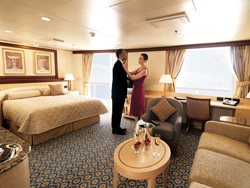
Category: Q4
Area: Approximately 508 sq. ft.
Retreat to an exclusive world of luxury with your own private residence at sea. Bold Cunard accent colors and thoughtful designs bring each space in your suite to life. An attentive butler is on hand at all times to truly customize your voyage experience.
Each Queens Grill Penthouse Suite includes:- Access to the exclusive Queens Grill restaurant, where you can dine any time at your reserved table.
- Spacious lounge area with seating.
- Bedroom area with Cunarder bed configurable to king-size or two single beds.
- Pillow concierge menu with a variety of types to choose from.
- Bathroom with bath and shower and separate dressing area.
- Spacious private balcony with seating and sea views.
- Satellite TV with movie and music channels in bedroom and lounge areas.
- Feature vanity and desk with hairdryer.
- Fresh flowers.
- Binoculars and world atlas to track your travels.
- UK, USA, and European power sockets.
- Penhaligon's toiletries.
- Luxury bathrobes and slippers.
- Complimentary mini-bar stocked with your choice of beer, wine, spirits, and soft drinks.
- Specialty tea and coffee making facilities.
- Daily fresh fruit.
- Pre-dinner canapés.
- Welcome bottle of Champagne.
- Complimentary room service menu.
- Dine in-suite from the exclusive Queens Grill menu.
- Exclusive access to the Grills Lounge and outside Grills Terrace.
- Concierge service for on-board reservations and shore experiences.
- A dedicated butler and steward to keep your suite in fine order day and night and host the perfect soirée.
- Priority embarkation and disembarkation.

Category: Q3
Area: Approximately 520-596 sq. ft.
Retreat to an exclusive world of luxury with your own private residence at sea. Bold Cunard accent colors and thoughtful designs bring each space in your suite to life. An attentive butler is on hand at all times to truly customize your voyage experience.
Each Queens Grill Penthouse Suite includes:- Access to the exclusive Queens Grill restaurant, where you can dine any time at your reserved table.
- Spacious lounge area with seating.
- Bedroom area with Cunarder bed configurable to king-size or two single beds.
- Pillow concierge menu with a variety of types to choose from.
- Bathroom with bath and shower and separate dressing area.
- Spacious private balcony with seating and sea views.
- Satellite TV with movie and music channels in bedroom and lounge areas.
- Feature vanity and desk with hairdryer.
- Fresh flowers.
- Binoculars and world atlas to track your travels.
- UK, USA, and European power sockets.
- Penhaligon's toiletries.
- Luxury bathrobes and slippers.
- Complimentary mini-bar stocked with your choice of beer, wine, spirits, and soft drinks.
- Specialty tea and coffee making facilities.
- Daily fresh fruit.
- Pre-dinner canapés.
- Welcome bottle of Champagne.
- Complimentary room service menu.
- Dine in-suite from the exclusive Queens Grill menu.
- Exclusive access to the Grills Lounge and outside Grills Terrace.
- Concierge service for on-board reservations and shore experiences.
- A dedicated butler and steward to keep your suite in fine order day and night and host the perfect soirée.
- Priority embarkation and disembarkation.

Category: Q2
Area: Approximately 1100 sq. ft.
Retreat to an exclusive world of luxury with your own private residence at sea. Bold Cunard accent colors and thoughtful designs bring each space in your suite to life. An attentive butler is on hand at all times to truly customize your voyage experience.
Each Queens Grill Master Suite includes:- Access to the exclusive Queens Grill restaurant, where you can dine any time at your reserved table.
- Spacious lounge with seating and dedicated dining area.
- Bedroom with Cunarder bed configurable to king-size or two single beds.
- Pillow concierge menu with seven pillow types to choose from.
- Marble bathroom with twin washbasins, bathtub and walk-in shower.
- Spacious private balcony with seating and sea views.
- Satellite TV with movie and music channels in bedroom and lounge areas.
- Feature vanity with hairdryer.
- Writing desk with a set of personalized stationery.
- Fresh flowers.
- Binoculars and world atlas to track your travels.
- UK, USA, and European power sockets.
- Penhaligon's toiletries.
- Luxury bathrobes and slippers.
- Complimentary mini-bar stocked with your choice of beer, wine, spirits, and soft drinks.
- Specialty tea and coffee making facilities.
- Daily fresh fruit.
- Pre-dinner canapés.
- Welcome bottle of Champagne.
- Complimentary room service menu.
- Dine in-suite from the exclusive Queens Grill menu.
- Exclusive access to the Grills Lounge and outside Grills Terrace.
- Concierge service for on-board reservations and shore experiences.
- A dedicated butler and steward to keep your suite in fine order day and night and host the perfect soirée.
- Priority embarkation and disembarkation.
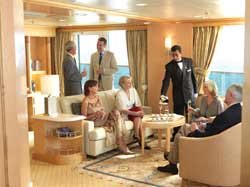
Category: Q1
Area: Approximately 1319-1555 sq. ft.
Retreat to an exclusive world of luxury with your own private residence at sea. Striking interior designs bring each space in your suite to life, indulging your senses with a rich tapestry of colors, materials, and art. An attentive butler is on hand at all times to truly customize your voyage experience.
The Queens Grill Grand Suite includes:- Access to the exclusive Queens Grill restaurant, where you can dine any time at your reserved table.
- Separate room that can be used as a den or a bedroom.
- Dedicated dining area.
- Spacious lounge area with seating and space to host guests.
- Bedroom area with Cunarder bed configurable to king-size or two single beds.
- Pillow concierge menu with seven pillow types to choose from.
- Twin marble bathrooms and dressing area.
- Spacious private balcony with seating and sea views.
- Satellite TV with movie and music channels in bedroom and lounge areas.
- Feature vanity with hairdryer.
- Workspace with a set of personalized stationery.
- Fresh flowers.
- Binoculars and world atlas to track your travels.
- UK, USA, and European power sockets.
- Penhaligon's toiletries.
- Luxury bathrobes and slippers.
- Butler's pantry.
- Complimentary mini-bar stocked with your choice of beer, wine, spirits, and soft drinks.
- Specialty tea and coffee making facilities.
- Daily fresh fruit.
- Pre-dinner canapés.
- Welcome bottle of Champagne.
- Complimentary room service menu.
- Dine in-suite from the exclusive Queens Grill menu.
- Exclusive access to the Grills Lounge and outside Grills Terrace.
- Concierge service for on-board reservations and shore experiences.
- A dedicated butler and steward to keep your suite in fine order day and night and host the perfect soirée.
- Priority embarkation and disembarkation.

| Symbol | Description |
|---|---|
 | Lift |
 | 2 lower berths and 1 upper berth |
 | 3rd berth is a single sofa bed |
 | 3rd and 4th berth is a single sofa bed and one upper bed |
 | Views obstructed by lifeboats |
 | Views partially obstructed by lifeboat mechanism |
 | Wheelchair-accessible |
 | Staterooms are shaded by bridge wings |
 | Stateroom has forward-facing ocean views |
 | Stateroom has metal-fronted balcony |
 | 3rd and 4th berths are single sofabeds |
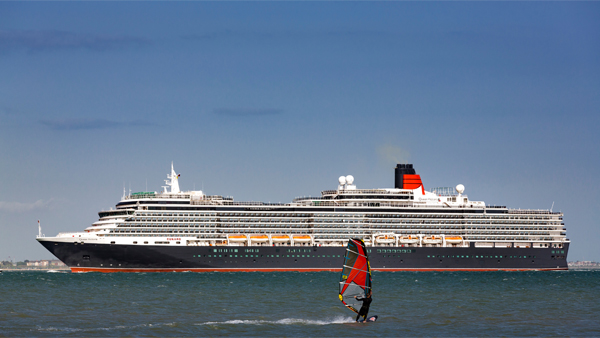
- Ship Name: Queen Victoria
- Year Built: 2007
- Year Refurbished: 2017
- Year Entered Present Fleet: 2007
- Maximum Capacity: 2,061
- Number of Passenger Decks: 12
- Number of Crew: 981
- Officers' Nationality: British
- Ocean-View without Balcony: 147
- Ocean-View with Balcony: 609
- Total Inside Staterooms: 152
- Tonnage (GRT): 90,000
- Capacity Based on Double Occupancy: 2,052
- Country of Registry: Bermuda
- Total Staterooms: 1,035
- Suites with Balcony: 127
- Crew/Hotel Staff Nationality: International
Costco Member Reviews

Terms & Conditions
*Price shown is per person based on double occupancy and is valid for select stateroom categories only. Click on the Terms & Conditions link below for details.
†One Digital Costco Shop Card per room/stateroom, per stay. The exact amount of the Digital Costco Shop Card will be calculated during the booking process. The Digital Costco Shop Card promotion is nontransferable and may not be combined with any other promotion. A Digital Costco Shop Card will arrive by email approximately 10 days after the start of your cruise. Click on the Terms & Conditions link below for additional information.
© Carnival plc. Ships' Registry: Bermuda. The Cunard logo and logotype, Queen Mary 2, Queen Victoria, Queen Elizabeth, and Queen Anne are registered trademarks of Carnival plc, an English company trading as Cunard.
Digital Costco Shop Card
Book this vacation or cruise with Costco Travel and receive a Digital Costco Shop Card. The Digital Costco Shop Card is a convenient payment option in our warehouses and on Costco.ca.









